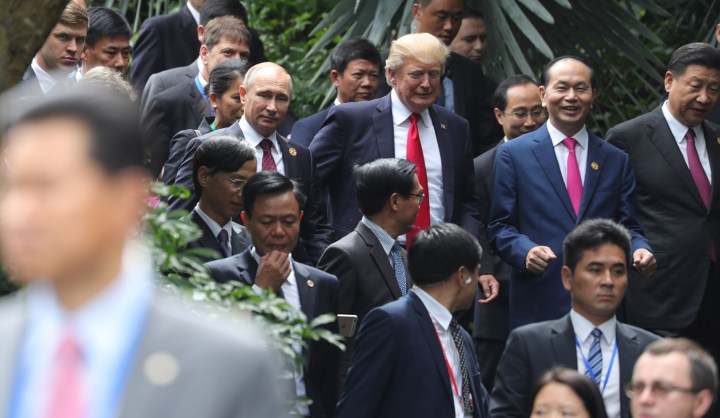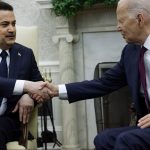World
US: Donald’s Less Than Excellent Asian Adventure

US President Donald Trump made his long-awaited big splash of a trip to Asia and all it did for him was to lower his standing as a man who can be trusted, who understands the world, and even has the clarity of his own thoughts. J. BROOKS SPECTOR takes a look.
For a while, many people had hopes (and some increasingly fervent prayers) that Donald Trump’s five-nation trip to East Asia would show a more mature man who was finally – finally! – ready to engage with some 40% of the globe, shorn of that egotistical, rabble-rousing braying that has come to be the gold standard of his Queens-tainted public pronouncement shtick for both national and international stages. Ultimately, there really was no chance of that happening right to the end, even though he did manage to keep it together for a significant portion of his trip. But, as things went on, he began to look more and more like a bottle of one’s favourite carbonated beverage that has been very well shaken up, and is just about ready to pop its lid from the air pressure building up inside.
In fact, if the crucial intangibles of such a trip and the views he articulated during it are included in the scoring, it has been much, much worse than the modest “gentleman’s C grade” he specialised in while he was at university. During this trip, the American president succeeded in undermining the foundations of a bi-partisan understanding – both nationally and throughout much of the world – that was painfully achieved in the 70-plus years after World War II; an understanding that contributed greatly to the global growth coming out of the increasingly globalised community.
Despite sometimes glaringly unequal impacts on the economic health of nations in the aftermath of the 2008-9 financial crisis, it remains clear that the trend of globalisation among increasingly open capitalist economies (including China’s version of state-guided capitalist growth, post-Deng Xiaoping) has led the way to bringing hundreds of millions of heretofore very poor people in Asia into a modest middle-class existence. The millions of newly minted middle-class citizens, and the thousands of dollar millionaires and billionaires in a place like China, bear testimony to that. But in one short period, President Trump threw some icy cold water on any real American participation in any global economic project – at least as long as Trump is in the White House.
At the APEC (Asia Pacific Economic Co-operation) Forum taking place in Da Nang, Vietnam, one of the key moments in the trip, and standing in front of dozens of global leaders from the entirety of the Pacific littoral writ large, Trump shrugged off any future multilateral commitments or even, effectively, multilateral conversations on international trade and economics. He’s already pulled out of the 12-nation TransPacific Partnership pact, and at the APEC meeting he insisted that only bilateral pacts would find any favour with him. In an obvious smack aimed at him, the remaining 11 members of the TPP agreed to go forward on the project, even without the US, despite the fact that it originally was an American idea, a part of the Obama administration’s “pivot to the East”.
The TPP economies, taken together, represent a major slice of global trade, so, on the face of it, it would have seemed a good idea to be part of an unparalleled effort to loosen up the restrictions of trade regulations for the benefit of American exports and consumers’ satisfaction on prices, both. But not in Trump’s universe. And he also took a few swipes at the World Trade Organisation while he has been at it, claiming that the whole edifice has been rigged against the US – again, despite the fact that the US was a key mover of the WTO, too, back when it began.
Ah well. There was more, of course. While Trump was on his extensive Asian safari, he kept up a steady drumbeat of contradictory messages about North Korea, ranging from an apparently unconsummated desire to become Kim Jong-un’s friend to – yet again – some not so veiled threats and insults (mirrored by Kim’s own taunts). There was also a near-constant effort to put North Korea’s missile and nuclear programmes at ground zero in any and all discussions in Japan, South Korea and China with those nations’ leaders, almost to the exclusion of anything else. At one point he even told the Japanese that they should have, could have, would have exercised their samurai warrior spirit and knocked out those North Korean missile tests over Japanese territory – but only if they had already had some newly procured, American anti-missile missile systems in place, locked and loaded.
While he was in China, he was the recipient of what the Chinese chose to describe as a five star-plus state visit, replete with all the pomp, ceremony and ego-stroking possible when a government has the resources China does these days. Fully understanding the Trumpster’s desperate hunger for an infinite amount of untrammelled ego gratification, his hosts organised a lavish reception inside the Forbidden City complex, vast pageantry with precision-drilled military units, and the obligatory walk on the Great Wall for Mrs T. They took the perfect measure of the US president’s never-ending need to be loved, admired, stroked, pampered and brushed (rather too much like one of the author’s fussier cats). Trump announced that he and China have a great relationship – effectively putting back in the box all those strident battle cries about currency manipulation, rapine, and pillaging of the American economy he was so on about during the election in 2016.
The Chinese, in fact, reached back for their understanding of this kind of thing through their 5,000 years of dealing with visiting barbarians, come to pay a call on – or pay obeisance to – the emperor. This approach treats a visitor with apparently exquisite respect and politeness, but with the slight tang of a faintly visible distain as they are told what is expected of civilised people. Big ouch, and score one for Beijing.
In fact, his comments about his splendid reception in China sounded eerily like the way Sally Fields had gushed to that Academy Awards audience when she finally won an Oscar, saying, “You love me, you really love me.” Or perhaps someone had whispered to him the famous Louis XIV adage, “L’etat c’est moi,”as he confused the entirety of America with himself. Who knows? In fact, so overwhelmed was the Donald with his treatment and all the glitter that in deference to the Chinese desire for total control over the event, the Trump party agreed to do away with those pesky press questions directed at the two leaders at their joint media conference. Unpleasant things like human rights issues might have come up if that had happened.
The response from Time magazine to all this fawning and forelock tugging, amid the withdrawal from the rough and tumble of the global economy by America’s president, was on display in a magazine cover that was eloquent in its concision. It read, simply: “China won” – and in two languages. Instead of economic autarky, the Chinese leader stole the show with his speech at APEC that spoke to still more economic globalism, albeit on a Chinese template. And the Chinese have kept moving on their great “Road and Belt Initiative” designed to link multiple nations all across East, Central and Western Asia through a vast amount of Chinese investment in infrastructure – and the better to buy Chinese manufactures. And of Trump’s US? Gearing up to negotiate or renegotiate small beer, individual trade deals with one country at a time.
Summing up this visit, yes, the Trump administration will inevitably trumpet a variety of trade and sales deals signed by a delegation of business leaders along for the ride. But the truth of things is that such delegations always come along on such visits, and these kinds of deals are always part of a big presidential visit. In fact, right back to 1853, when the US first sent a flotilla of naval ships to open up Japan and Siam to American trade and better the circumstances of shipwrecked sailors, the point of the trip had been to better the terms of trade. Nothing new here with some trade deals by companies. Sorry.
Of course, throughout this entire trip – right through to Trump’s tete-a-tete with Rodrigo Duterte, the trigger-happy president of the Philippines, in his anti-drug campaign – Trump’s demeanour with democratically elected and constrained leaders like Moon Jae-in was distinctly less warm and cuddly than his embrace of the more authoritarian members of the leadership fraternity such as Vietnamese leader Tr?n ??i Quang, Vladimir Putin, Xi Jinping, and even Duterte (although he had been elected, to be sure). Plainly Trump sees himself in their mould, rather than with leaders who must deal with the rowdier versions of politics where the opposition doesn’t get locked up summarily – and where discussions of human and civil rights aren’t a mere frippery.
Eventually, though, the Trump pressure cooker had to give. On Air Force One, he finally let rip a fusillade of comments about how he had asked Vladimir Putin several times if he had ordered any meddling in the 2016 election in the US and, having been told “no”, announced that he, Trump, believed the former KBG operative without question. And, anyway, the whole thing was just sour grapes by the Democrats who still can’t accept that he won the election yugely, as well as the fault of those vile political hacks in the intelligence community who had wrongly concluded the meddling had taken place.
Eventually, with his fingernails scraping across the chalkboard, he was dragged into clarifying that what he really meant was that he believed that Putin really believed that position, even if he, Trump, now believed that his current intelligence community heads knew whereof they spoke, as opposed to the hacks. Not surprisingly, some of those “political hacks” took to the Sunday news talk shows and shot right back.
Conservative columnist Jennifer Rubin, writing about this for the Washington Post, said:
“Former CIA director John Brennan and former director of national intelligence James R. Clapper Jr. appeared on CNN’s ‘State of the Union’ on Sunday and responded forcefully to President Trump’s seeming acceptance of Russian President Vladimir Putin’s claim that he did not interfere in our election. (Trump later clarified his statement to say that he just believed Putin believed this — which is nonsensical. Is he saying Putin doesn’t know what is going on in Russia?) Brennan had this exchange with CNN’s Jake Tapper:
“JAKE TAPPER: What is your response, Mr. Brennan, to what President Trump said about Vladimir Putin and U.S. intelligence agencies?
“JOHN BRENNAN, FORMER CIA DIRECTOR: Well, I think Mr. Trump knows that the intelligence agencies, specifically CIA, NSA and FBI, the ones that really have responsibility for counterintelligence and looking at what Russia does, it’s very clear that the Russians interfered in the election. And it’s still puzzling as to why Mr. Trump does not acknowledge that and embrace it, and also push back hard against Mr. Putin. The Russian threat to our democracy and our democratic foundations is real. And I think his continuing to not say very clearly and strongly that this is a national security problem, and to say to Mr. Putin, we know you did it, you would have to stop it, because there are going to be consequences if you don’t.
“Asked if this posed a danger to the United States, Clapper said ‘the Russians do not harbour good intentions toward the United States, and there shouldn’t be any illusions or any ambiguity about that. And our president — the president fosters that ambiguity.’ Trump is getting played, Clapper said flat-out. Brennan weighed in again:
“Well, I think Mr. Putin is very clever in terms of playing to Mr. Trump’s interest in being flattered. And, also, I think Mr. Trump is, for whatever reason, either intimidated by Mr. Putin, afraid of what he could do or what might come out as a result of these investigations. So, it’s very worrisome. And I think it sends a worrisome, very disturbing signal to our allies and partners who are concerned about Russian interference in their democratic processes as well. So, it’s either naivete, ignorance or fear, in terms of what Mr. Trump is doing vis-a-vis the Russians.”
At the minimum, there is now a distinct whiff of gunpowder in the air about all this in Washington. Meanwhile, Special Prosecutor Robert Mueller grinds away at his investigation – chipping away at the Trump team’s defences with an indictment here, a guilty plea there – and the implicit promise of more to come. Or, as Republican Senator John McCain described it when asked if there was another shoe yet to drop in Mueller’s investigations, had replied tartly that it was a veritable centipede out there!
The problems for Donald Trump in all of this, of course, are that this whole trip came along while the Mueller investigation (and several congressional ones) into Russian meddling and any Trump campaign connections to this continues; as the Republicans were crushed in several off-year elections such as governorships in New Jersey and Virginia; and as Alabama senatorial candidate Roy Moore has become embroiled in charges of a paedophilic pattern of behaviour that has overwhelmed Republicans and set them against each other in efforts at damage control. The election for that Senate seat (to occupy the seat Jeff Sessions left to become attorney general) comes next month, and numbers of GOP politicians are struggling with how to get Moore off the ballot as they contemplate the particularly doleful possibility that Doug Jones, the Democratic candidate – seemingly a dead man walking politically, just a few weeks ago – might even win this election, thereby narrowing the Republicans’ margin in the Senate even further than it is now.
And, facing the 2018 mid-term election, the Trump administration now faces the cratering popularity of their standard-bearer and their evident lack of any legislative achievements to show for the year. Their vaunted tax reform plan seems unlikely to even come to a final resolution before the legislative calendar runs out for the year.
Taken together, all of this makes it a possibility they might even lose the Senate and – albeit in a much further stretch – the House as well. Presidential international visits, especially one with the kind of publicity this one has had, are supposed to enhance the prestige and impact of a president. However, this time, a long march across Asia has brought no real benefit to Donald Trump, certainly let alone to the nation; and it may even have undermined Trump’s standing further, both domestically and internationally, as his intellectual and policy confusion has become ever more exposed to the world. DM
Photo: Surrounded by a security entourage, Russian President Vladimir Putin (C-L), US President Donald J. Trump (C), China’s President Xi Jinping (L) and APEC Chairman and Vietnamese President Tran Dai Quang (C-R) speak as they head to a group photo session with fellow APEC leaders at the 25th Asia-Pacific Economic Cooperation (APEC) summit in Da Nang, Vietnam, 11 November 2017. Photo: Mikhail Klimentyev/(EPA-EFE/SPUTNIK/KREMLIN)

















 Become an Insider
Become an Insider